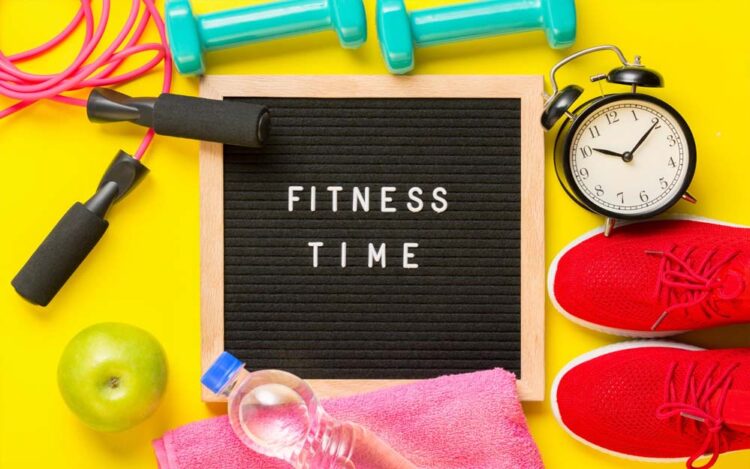Embarking on a new fitness journey is always filled with a mix of excitement and anticipation. The initial burst of motivation can get us through the door of the gym, onto the first steps of the running track, or onto the mat for a yoga session. However, the true magic happens when this initial excitement transforms into a consistent routine. Turning workouts into daily fitness habits isn’t just about relying on bursts of motivation; it’s about strategically embedding exercise into the fabric of our daily lives.
For many of us, particularly men and women who are eager to make exercise a lasting part of their lives, the challenge lies not in starting, but in continuing. The key to long-term success in fitness is building habits that stick. This journey is about more than just physical transformation; it’s about evolving our lifestyles in a way that promotes sustained health and well-being.
Inspirational messages from fitness experts often remind us, “It’s not about having time. It’s about making time.” This powerful statement underscores the essence of fitness habits. Making exercise a non-negotiable part of your day is crucial. It’s not merely about finding the time but making it a priority, similar to how we prioritize work, family, and other responsibilities.
Creating fitness habits that last is about smart strategy as much as it is about effort. It involves understanding your body, recognizing your limits, and gently pushing yourself to improve, day by day. This process is not a sprint but a marathon—a gradual build-up towards a healthier, more active lifestyle that sticks.
Start Small, Win Big
In the pursuit of fitness habits that endure, the philosophy of “Start Small, Win Big” is indispensable. This approach is particularly beneficial for those embarking on their fitness journey or looking to revive their routine. The allure of immediate, dramatic changes can be tempting, but history and experts alike teach us that lasting success comes from small, consistent efforts.
Fitness experts often highlight the importance of setting achievable goals. A common piece of advice is, “Don’t aim to run a marathon on your first day.” This encapsulates the essence of starting small. Begin with manageable workouts that don’t overwhelm your schedule or your body. It could be as simple as a 10-minute jog, a brief home workout session, or even daily stretches. The goal is to integrate these activities into your daily routine without feeling like a burden.
One major advantage of starting small is the sense of achievement it brings. Completing a 10-minute workout is far more encouraging than failing a 60-minute one. This sense of progress is crucial in building and sustaining fitness habits. Every small win is a step closer to your larger goals, creating a positive feedback loop that motivates continued effort.
Find Your Fitness Fun
Turning workouts into lasting fitness habits hinges on one crucial element: enjoyment. It’s simple—if you love what you do, you’re more likely to stick with it. The world of fitness is vast and varied, offering something for everyone, whether it’s the dynamic energy of a dance class, the peaceful focus of yoga, or the adventurous spirit of hiking.
Diversity in your fitness routine not only keeps things interesting but also ensures a balanced approach to your physical health. Different activities challenge your body in unique ways, enhancing overall fitness and well-being.
The Power of Scheduling
Scheduling is a game-changer for establishing lasting fitness habits. By setting specific times for your workouts, you elevate their importance to that of any other crucial appointment. This commitment helps integrate exercise seamlessly into your daily routine, making it a natural part of your lifestyle rather than an afterthought.
Finding the right time for exercise is personal; it could be early mornings that kickstart your day with energy or evenings that help you unwind. What matters most is consistency. A regular schedule trains your body and mind to anticipate and embrace workout sessions.
The mantra “If it’s not scheduled, it’s not real” captures the essence of this approach. Treating workouts as non-negotiable appointments reinforces the value you place on your health, making fitness a consistent and enjoyable part of your daily routine.
Listen to Your Body
Listening to your body is a cornerstone of building and maintaining fitness habits that last. It’s about tuning in to your body’s signals and responding with care, whether it’s needing rest, adjusting your workout intensity, or recognizing when you can push a little harder. This mindfulness ensures not only the sustainability of your fitness routine but also your overall well-being.
Understanding the difference between good pain, like the burn of a muscle being pushed in a healthy way, and bad pain, which signals potential injury, is crucial. Experts often remind us, “Pain is the body’s way of asking for attention.” Ignoring these signals can lead to setbacks, making it important to adjust your workouts accordingly.
Rest days are not a sign of weakness but a necessary component of any fitness regimen. They allow your muscles to recover and grow stronger, preventing burnout and injury. Incorporating active recovery days, such as gentle yoga or a leisurely walk, can also be beneficial.
Making It a Lifestyle
Transforming your fitness routine into a lifestyle is the ultimate goal for anyone looking to maintain their fitness habits long-term. This shift means moving beyond viewing exercise as a mere activity or a box to check off each day. Instead, it becomes an integral part of your daily life, as natural and necessary as eating or sleeping.
Making fitness a lifestyle involves weaving physical activity into the fabric of your everyday life. It’s about choosing to take the stairs instead of the elevator, biking to work instead of driving, or having active hobbies like hiking or playing sports on the weekends. It’s the small choices that add up, creating a life where fitness is not just a task but a way of being.
“Fitness is not a destination; it’s a way of life.” This perspective encourages a holistic approach to health, where exercise, nutrition, rest, and mental well-being all play interconnected roles. By embracing this holistic view, you align your actions with your health and wellness values, making fitness an enjoyable and fulfilling part of your daily experience.
In conclusion, building fitness habits that stick is about much more than occasional bursts of exercise; it’s about creating a sustainable lifestyle that celebrates and incorporates physical activity into your daily routine. This journey towards lifelong fitness is not a sprint but a marathon, requiring patience, consistency, and a positive mindset.
Remember, the path to establishing lasting fitness habits is unique for everyone. It’s about finding what works for you—whether that’s starting small, finding the joy in movement, listening to your body, or scheduling workouts as non-negotiable parts of your day. The ultimate goal is to make fitness a natural and enjoyable part of your life, something you look forward to rather than something you feel obligated to do.











